The Impact of Colonization on First People Health
VerifiedAdded on 2023/04/03
|14
|3033
|126
AI Summary
This essay discusses the impact of colonization on the health of Australia's First People. It explores the effects of public policies, intergenerational trauma, racism, and white privilege on their health outcomes.
Contribute Materials
Your contribution can guide someone’s learning journey. Share your
documents today.
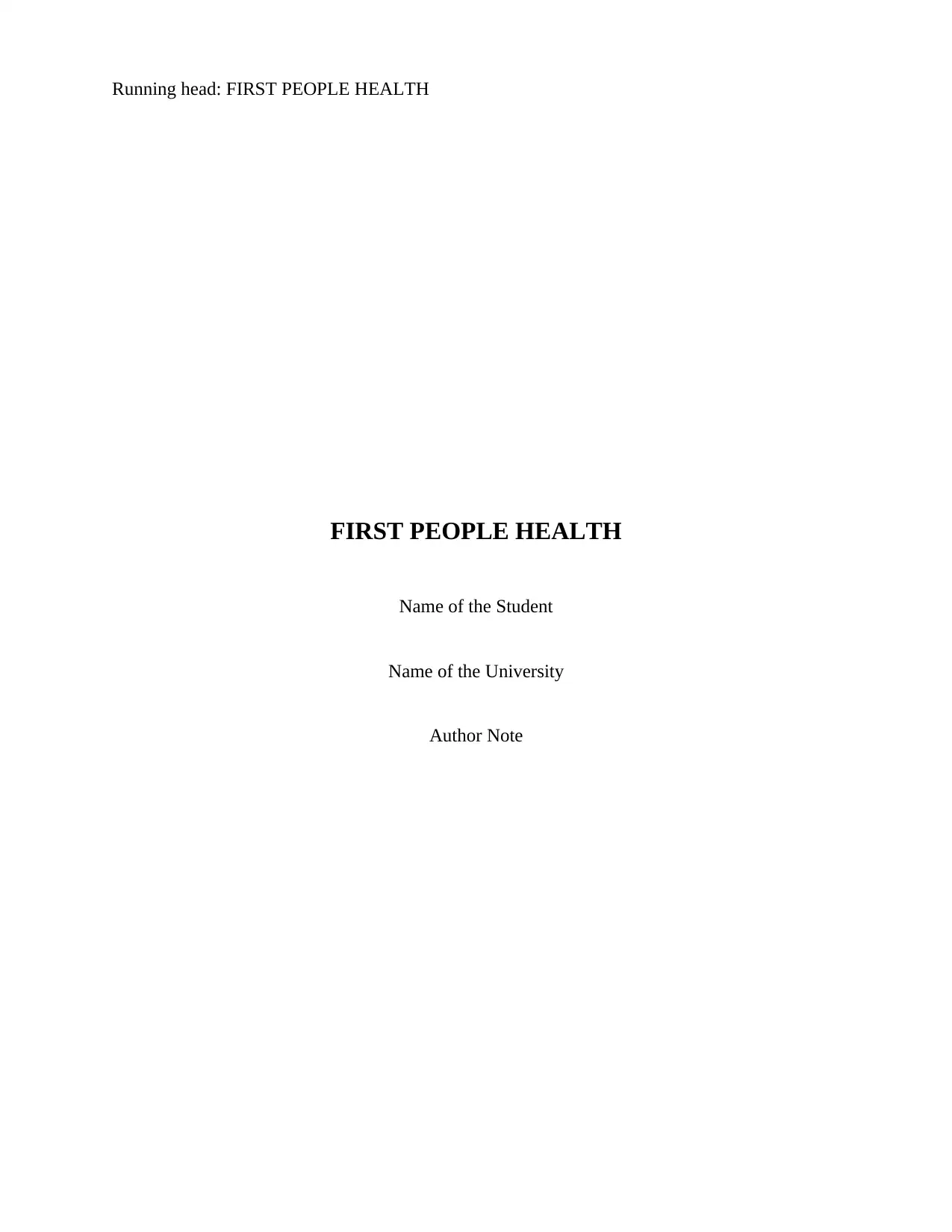
Running head: FIRST PEOPLE HEALTH
FIRST PEOPLE HEALTH
Name of the Student
Name of the University
Author Note
FIRST PEOPLE HEALTH
Name of the Student
Name of the University
Author Note
Secure Best Marks with AI Grader
Need help grading? Try our AI Grader for instant feedback on your assignments.
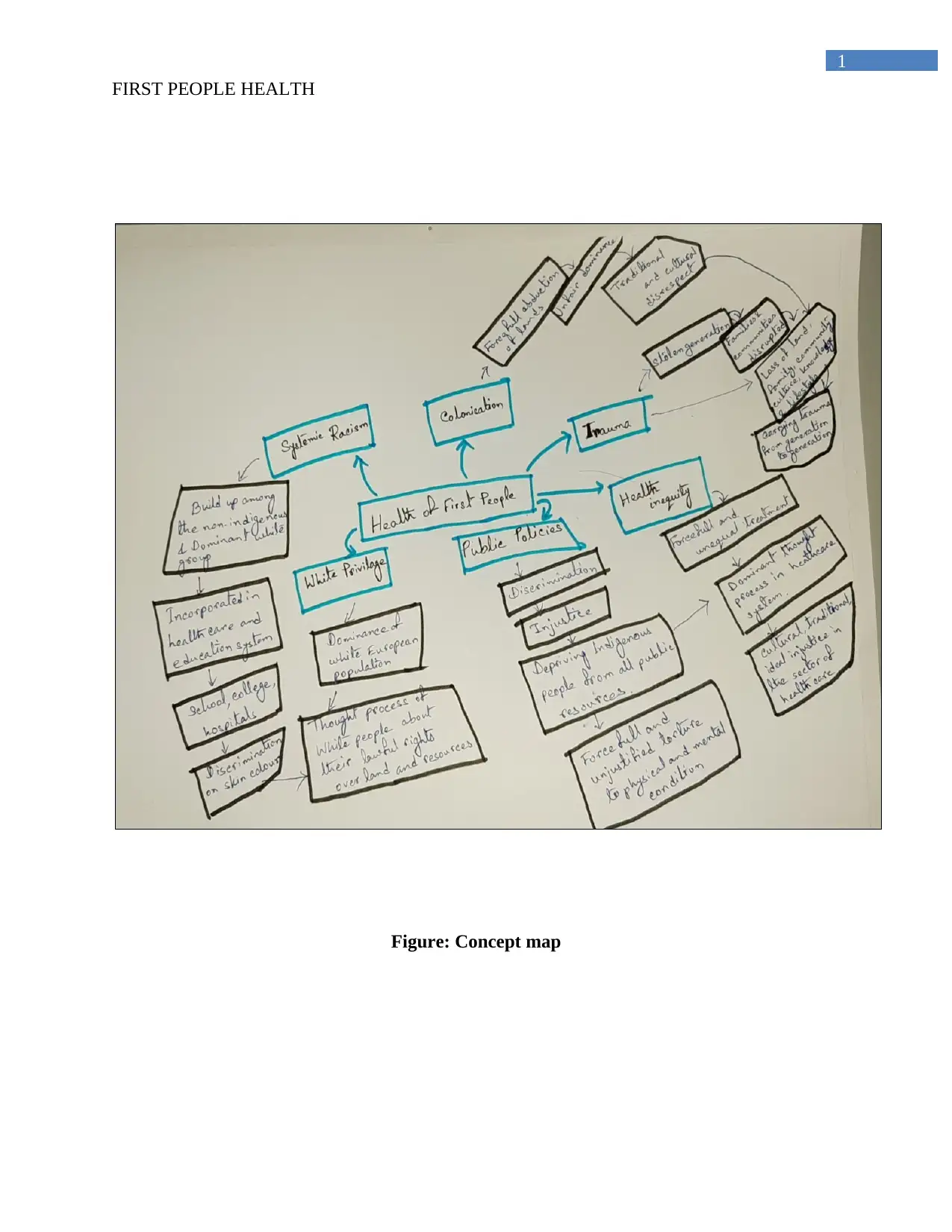
1
FIRST PEOPLE HEALTH
Figure: Concept map
FIRST PEOPLE HEALTH
Figure: Concept map
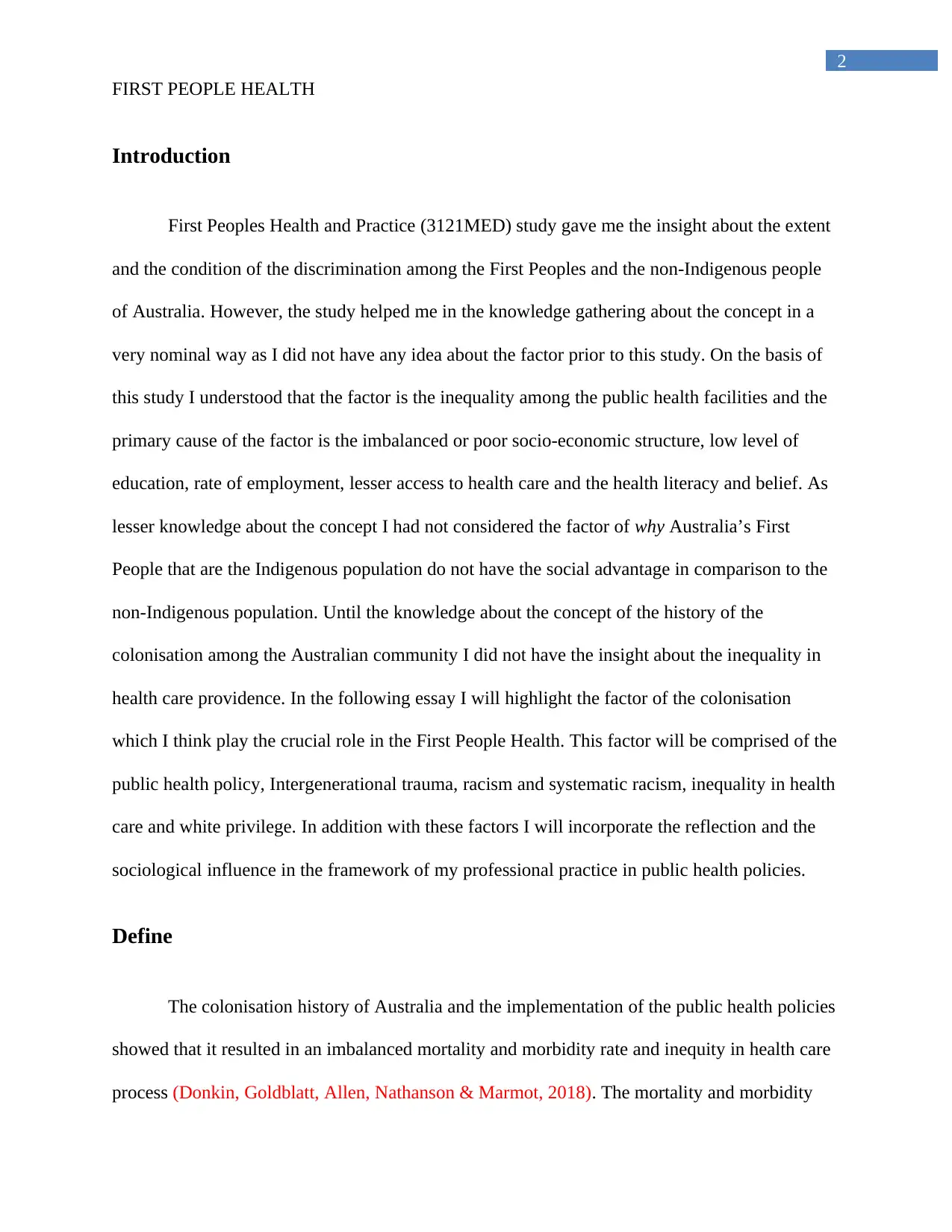
2
FIRST PEOPLE HEALTH
Introduction
First Peoples Health and Practice (3121MED) study gave me the insight about the extent
and the condition of the discrimination among the First Peoples and the non-Indigenous people
of Australia. However, the study helped me in the knowledge gathering about the concept in a
very nominal way as I did not have any idea about the factor prior to this study. On the basis of
this study I understood that the factor is the inequality among the public health facilities and the
primary cause of the factor is the imbalanced or poor socio-economic structure, low level of
education, rate of employment, lesser access to health care and the health literacy and belief. As
lesser knowledge about the concept I had not considered the factor of why Australia’s First
People that are the Indigenous population do not have the social advantage in comparison to the
non-Indigenous population. Until the knowledge about the concept of the history of the
colonisation among the Australian community I did not have the insight about the inequality in
health care providence. In the following essay I will highlight the factor of the colonisation
which I think play the crucial role in the First People Health. This factor will be comprised of the
public health policy, Intergenerational trauma, racism and systematic racism, inequality in health
care and white privilege. In addition with these factors I will incorporate the reflection and the
sociological influence in the framework of my professional practice in public health policies.
Define
The colonisation history of Australia and the implementation of the public health policies
showed that it resulted in an imbalanced mortality and morbidity rate and inequity in health care
process (Donkin, Goldblatt, Allen, Nathanson & Marmot, 2018). The mortality and morbidity
FIRST PEOPLE HEALTH
Introduction
First Peoples Health and Practice (3121MED) study gave me the insight about the extent
and the condition of the discrimination among the First Peoples and the non-Indigenous people
of Australia. However, the study helped me in the knowledge gathering about the concept in a
very nominal way as I did not have any idea about the factor prior to this study. On the basis of
this study I understood that the factor is the inequality among the public health facilities and the
primary cause of the factor is the imbalanced or poor socio-economic structure, low level of
education, rate of employment, lesser access to health care and the health literacy and belief. As
lesser knowledge about the concept I had not considered the factor of why Australia’s First
People that are the Indigenous population do not have the social advantage in comparison to the
non-Indigenous population. Until the knowledge about the concept of the history of the
colonisation among the Australian community I did not have the insight about the inequality in
health care providence. In the following essay I will highlight the factor of the colonisation
which I think play the crucial role in the First People Health. This factor will be comprised of the
public health policy, Intergenerational trauma, racism and systematic racism, inequality in health
care and white privilege. In addition with these factors I will incorporate the reflection and the
sociological influence in the framework of my professional practice in public health policies.
Define
The colonisation history of Australia and the implementation of the public health policies
showed that it resulted in an imbalanced mortality and morbidity rate and inequity in health care
process (Donkin, Goldblatt, Allen, Nathanson & Marmot, 2018). The mortality and morbidity
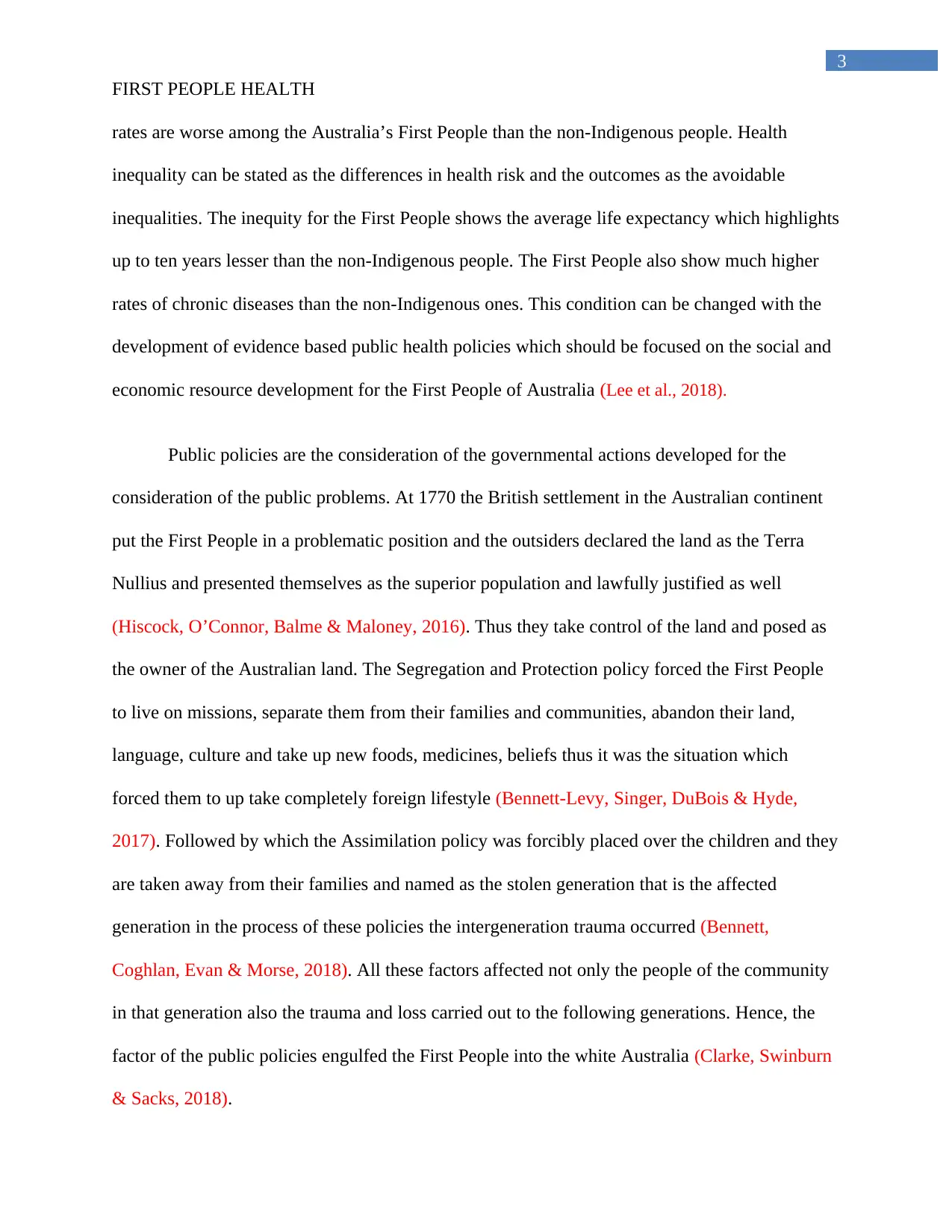
3
FIRST PEOPLE HEALTH
rates are worse among the Australia’s First People than the non-Indigenous people. Health
inequality can be stated as the differences in health risk and the outcomes as the avoidable
inequalities. The inequity for the First People shows the average life expectancy which highlights
up to ten years lesser than the non-Indigenous people. The First People also show much higher
rates of chronic diseases than the non-Indigenous ones. This condition can be changed with the
development of evidence based public health policies which should be focused on the social and
economic resource development for the First People of Australia (Lee et al., 2018).
Public policies are the consideration of the governmental actions developed for the
consideration of the public problems. At 1770 the British settlement in the Australian continent
put the First People in a problematic position and the outsiders declared the land as the Terra
Nullius and presented themselves as the superior population and lawfully justified as well
(Hiscock, O’Connor, Balme & Maloney, 2016). Thus they take control of the land and posed as
the owner of the Australian land. The Segregation and Protection policy forced the First People
to live on missions, separate them from their families and communities, abandon their land,
language, culture and take up new foods, medicines, beliefs thus it was the situation which
forced them to up take completely foreign lifestyle (Bennett-Levy, Singer, DuBois & Hyde,
2017). Followed by which the Assimilation policy was forcibly placed over the children and they
are taken away from their families and named as the stolen generation that is the affected
generation in the process of these policies the intergeneration trauma occurred (Bennett,
Coghlan, Evan & Morse, 2018). All these factors affected not only the people of the community
in that generation also the trauma and loss carried out to the following generations. Hence, the
factor of the public policies engulfed the First People into the white Australia (Clarke, Swinburn
& Sacks, 2018).
FIRST PEOPLE HEALTH
rates are worse among the Australia’s First People than the non-Indigenous people. Health
inequality can be stated as the differences in health risk and the outcomes as the avoidable
inequalities. The inequity for the First People shows the average life expectancy which highlights
up to ten years lesser than the non-Indigenous people. The First People also show much higher
rates of chronic diseases than the non-Indigenous ones. This condition can be changed with the
development of evidence based public health policies which should be focused on the social and
economic resource development for the First People of Australia (Lee et al., 2018).
Public policies are the consideration of the governmental actions developed for the
consideration of the public problems. At 1770 the British settlement in the Australian continent
put the First People in a problematic position and the outsiders declared the land as the Terra
Nullius and presented themselves as the superior population and lawfully justified as well
(Hiscock, O’Connor, Balme & Maloney, 2016). Thus they take control of the land and posed as
the owner of the Australian land. The Segregation and Protection policy forced the First People
to live on missions, separate them from their families and communities, abandon their land,
language, culture and take up new foods, medicines, beliefs thus it was the situation which
forced them to up take completely foreign lifestyle (Bennett-Levy, Singer, DuBois & Hyde,
2017). Followed by which the Assimilation policy was forcibly placed over the children and they
are taken away from their families and named as the stolen generation that is the affected
generation in the process of these policies the intergeneration trauma occurred (Bennett,
Coghlan, Evan & Morse, 2018). All these factors affected not only the people of the community
in that generation also the trauma and loss carried out to the following generations. Hence, the
factor of the public policies engulfed the First People into the white Australia (Clarke, Swinburn
& Sacks, 2018).
Paraphrase This Document
Need a fresh take? Get an instant paraphrase of this document with our AI Paraphraser
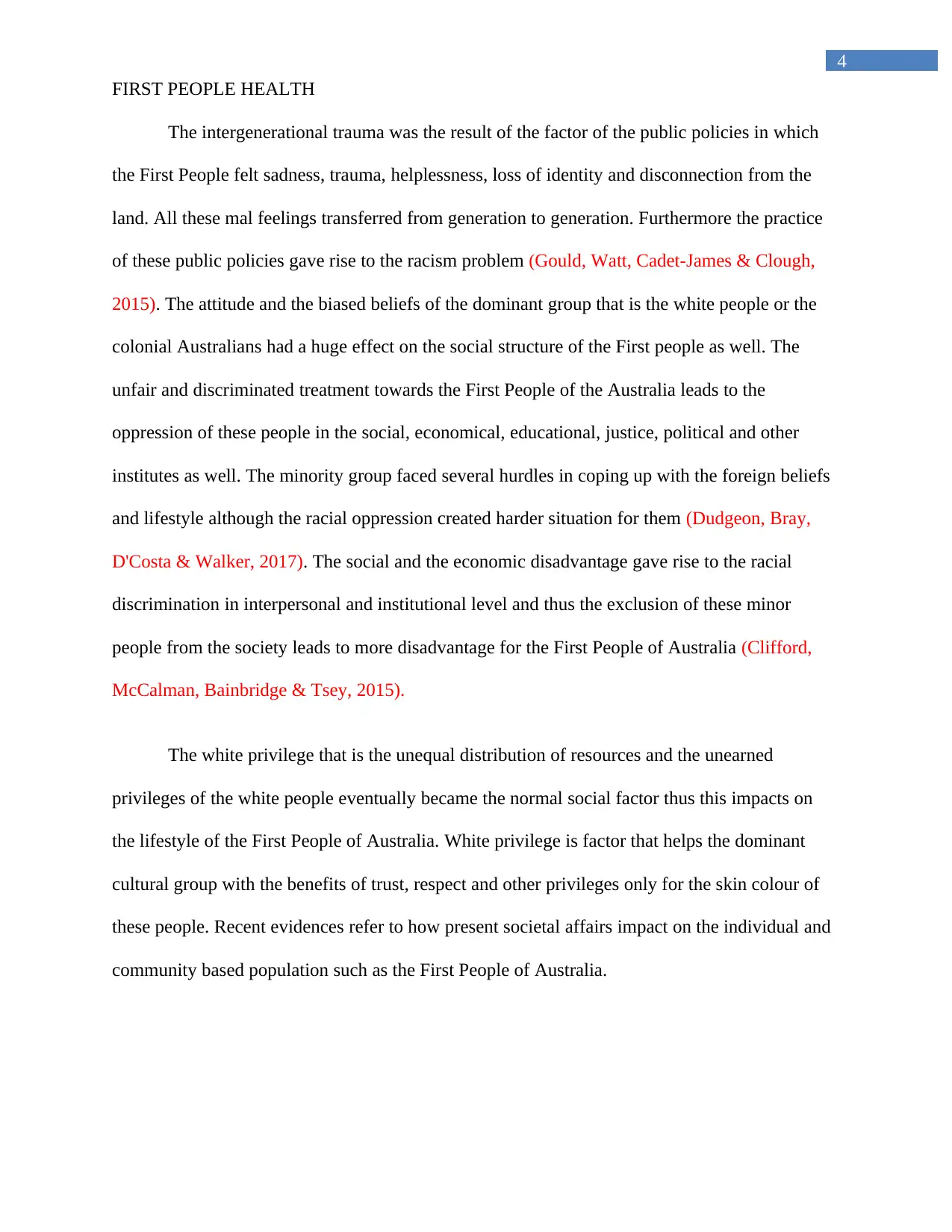
4
FIRST PEOPLE HEALTH
The intergenerational trauma was the result of the factor of the public policies in which
the First People felt sadness, trauma, helplessness, loss of identity and disconnection from the
land. All these mal feelings transferred from generation to generation. Furthermore the practice
of these public policies gave rise to the racism problem (Gould, Watt, Cadet-James & Clough,
2015). The attitude and the biased beliefs of the dominant group that is the white people or the
colonial Australians had a huge effect on the social structure of the First people as well. The
unfair and discriminated treatment towards the First People of the Australia leads to the
oppression of these people in the social, economical, educational, justice, political and other
institutes as well. The minority group faced several hurdles in coping up with the foreign beliefs
and lifestyle although the racial oppression created harder situation for them (Dudgeon, Bray,
D'Costa & Walker, 2017). The social and the economic disadvantage gave rise to the racial
discrimination in interpersonal and institutional level and thus the exclusion of these minor
people from the society leads to more disadvantage for the First People of Australia (Clifford,
McCalman, Bainbridge & Tsey, 2015).
The white privilege that is the unequal distribution of resources and the unearned
privileges of the white people eventually became the normal social factor thus this impacts on
the lifestyle of the First People of Australia. White privilege is factor that helps the dominant
cultural group with the benefits of trust, respect and other privileges only for the skin colour of
these people. Recent evidences refer to how present societal affairs impact on the individual and
community based population such as the First People of Australia.
FIRST PEOPLE HEALTH
The intergenerational trauma was the result of the factor of the public policies in which
the First People felt sadness, trauma, helplessness, loss of identity and disconnection from the
land. All these mal feelings transferred from generation to generation. Furthermore the practice
of these public policies gave rise to the racism problem (Gould, Watt, Cadet-James & Clough,
2015). The attitude and the biased beliefs of the dominant group that is the white people or the
colonial Australians had a huge effect on the social structure of the First people as well. The
unfair and discriminated treatment towards the First People of the Australia leads to the
oppression of these people in the social, economical, educational, justice, political and other
institutes as well. The minority group faced several hurdles in coping up with the foreign beliefs
and lifestyle although the racial oppression created harder situation for them (Dudgeon, Bray,
D'Costa & Walker, 2017). The social and the economic disadvantage gave rise to the racial
discrimination in interpersonal and institutional level and thus the exclusion of these minor
people from the society leads to more disadvantage for the First People of Australia (Clifford,
McCalman, Bainbridge & Tsey, 2015).
The white privilege that is the unequal distribution of resources and the unearned
privileges of the white people eventually became the normal social factor thus this impacts on
the lifestyle of the First People of Australia. White privilege is factor that helps the dominant
cultural group with the benefits of trust, respect and other privileges only for the skin colour of
these people. Recent evidences refer to how present societal affairs impact on the individual and
community based population such as the First People of Australia.
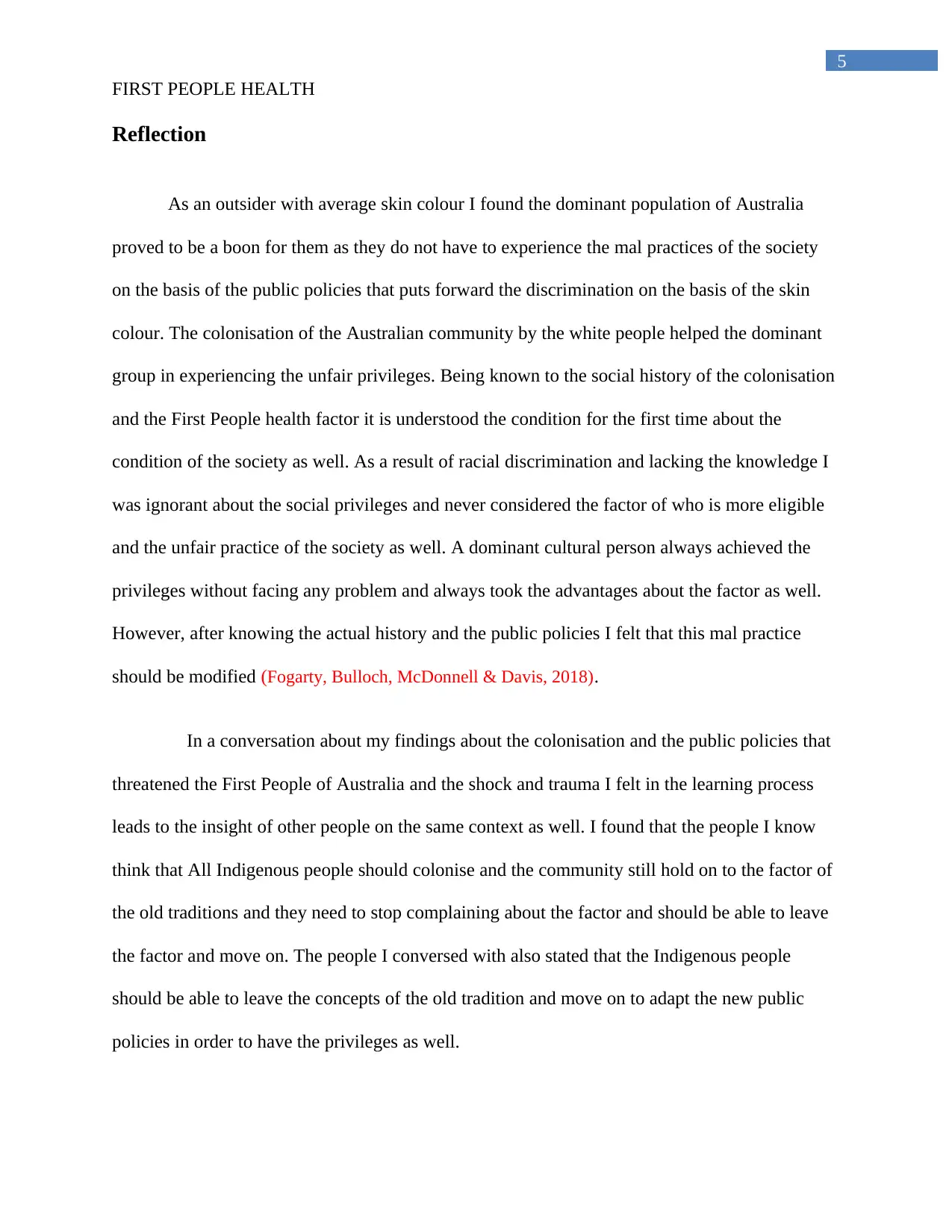
5
FIRST PEOPLE HEALTH
Reflection
As an outsider with average skin colour I found the dominant population of Australia
proved to be a boon for them as they do not have to experience the mal practices of the society
on the basis of the public policies that puts forward the discrimination on the basis of the skin
colour. The colonisation of the Australian community by the white people helped the dominant
group in experiencing the unfair privileges. Being known to the social history of the colonisation
and the First People health factor it is understood the condition for the first time about the
condition of the society as well. As a result of racial discrimination and lacking the knowledge I
was ignorant about the social privileges and never considered the factor of who is more eligible
and the unfair practice of the society as well. A dominant cultural person always achieved the
privileges without facing any problem and always took the advantages about the factor as well.
However, after knowing the actual history and the public policies I felt that this mal practice
should be modified (Fogarty, Bulloch, McDonnell & Davis, 2018).
In a conversation about my findings about the colonisation and the public policies that
threatened the First People of Australia and the shock and trauma I felt in the learning process
leads to the insight of other people on the same context as well. I found that the people I know
think that All Indigenous people should colonise and the community still hold on to the factor of
the old traditions and they need to stop complaining about the factor and should be able to leave
the factor and move on. The people I conversed with also stated that the Indigenous people
should be able to leave the concepts of the old tradition and move on to adapt the new public
policies in order to have the privileges as well.
FIRST PEOPLE HEALTH
Reflection
As an outsider with average skin colour I found the dominant population of Australia
proved to be a boon for them as they do not have to experience the mal practices of the society
on the basis of the public policies that puts forward the discrimination on the basis of the skin
colour. The colonisation of the Australian community by the white people helped the dominant
group in experiencing the unfair privileges. Being known to the social history of the colonisation
and the First People health factor it is understood the condition for the first time about the
condition of the society as well. As a result of racial discrimination and lacking the knowledge I
was ignorant about the social privileges and never considered the factor of who is more eligible
and the unfair practice of the society as well. A dominant cultural person always achieved the
privileges without facing any problem and always took the advantages about the factor as well.
However, after knowing the actual history and the public policies I felt that this mal practice
should be modified (Fogarty, Bulloch, McDonnell & Davis, 2018).
In a conversation about my findings about the colonisation and the public policies that
threatened the First People of Australia and the shock and trauma I felt in the learning process
leads to the insight of other people on the same context as well. I found that the people I know
think that All Indigenous people should colonise and the community still hold on to the factor of
the old traditions and they need to stop complaining about the factor and should be able to leave
the factor and move on. The people I conversed with also stated that the Indigenous people
should be able to leave the concepts of the old tradition and move on to adapt the new public
policies in order to have the privileges as well.
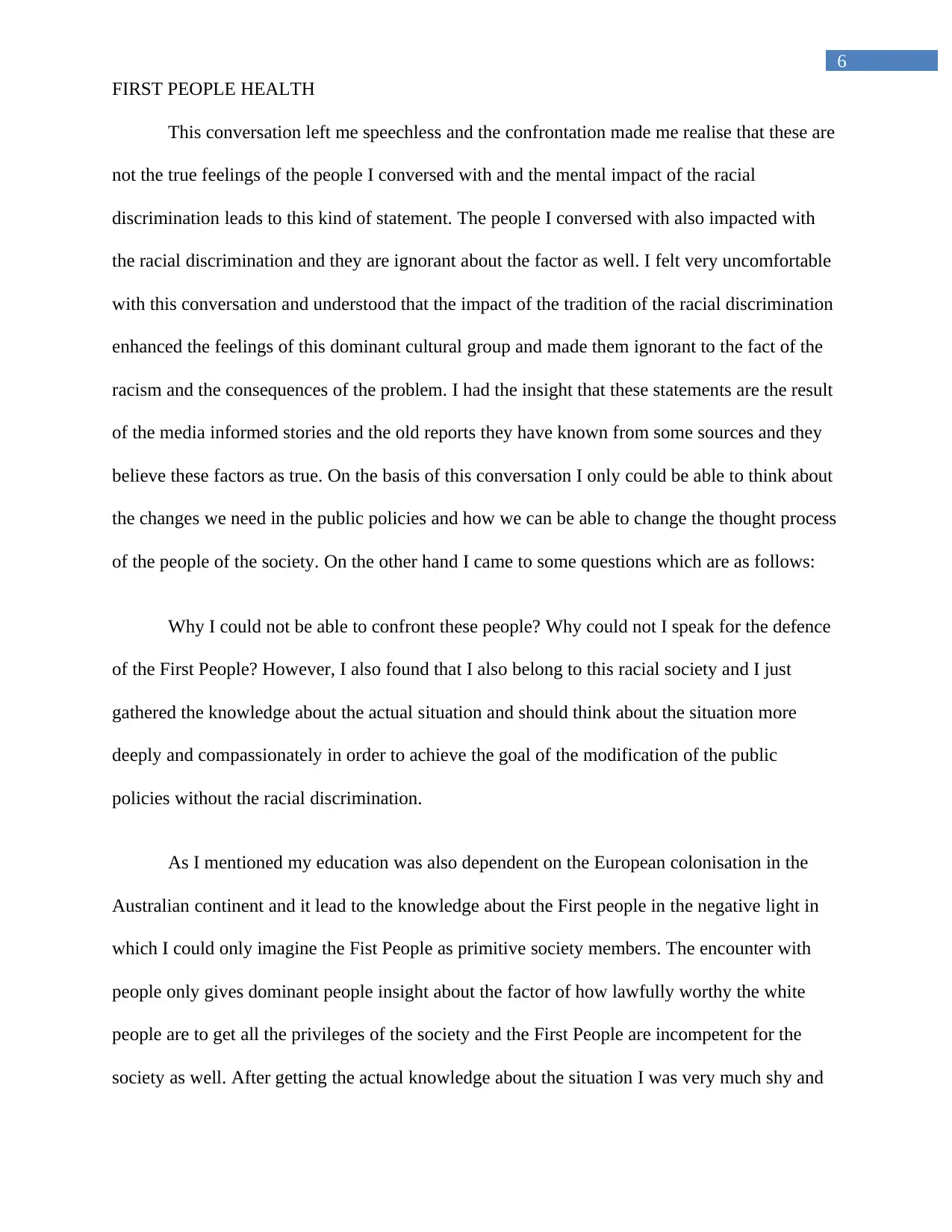
6
FIRST PEOPLE HEALTH
This conversation left me speechless and the confrontation made me realise that these are
not the true feelings of the people I conversed with and the mental impact of the racial
discrimination leads to this kind of statement. The people I conversed with also impacted with
the racial discrimination and they are ignorant about the factor as well. I felt very uncomfortable
with this conversation and understood that the impact of the tradition of the racial discrimination
enhanced the feelings of this dominant cultural group and made them ignorant to the fact of the
racism and the consequences of the problem. I had the insight that these statements are the result
of the media informed stories and the old reports they have known from some sources and they
believe these factors as true. On the basis of this conversation I only could be able to think about
the changes we need in the public policies and how we can be able to change the thought process
of the people of the society. On the other hand I came to some questions which are as follows:
Why I could not be able to confront these people? Why could not I speak for the defence
of the First People? However, I also found that I also belong to this racial society and I just
gathered the knowledge about the actual situation and should think about the situation more
deeply and compassionately in order to achieve the goal of the modification of the public
policies without the racial discrimination.
As I mentioned my education was also dependent on the European colonisation in the
Australian continent and it lead to the knowledge about the First people in the negative light in
which I could only imagine the Fist People as primitive society members. The encounter with
people only gives dominant people insight about the factor of how lawfully worthy the white
people are to get all the privileges of the society and the First People are incompetent for the
society as well. After getting the actual knowledge about the situation I was very much shy and
FIRST PEOPLE HEALTH
This conversation left me speechless and the confrontation made me realise that these are
not the true feelings of the people I conversed with and the mental impact of the racial
discrimination leads to this kind of statement. The people I conversed with also impacted with
the racial discrimination and they are ignorant about the factor as well. I felt very uncomfortable
with this conversation and understood that the impact of the tradition of the racial discrimination
enhanced the feelings of this dominant cultural group and made them ignorant to the fact of the
racism and the consequences of the problem. I had the insight that these statements are the result
of the media informed stories and the old reports they have known from some sources and they
believe these factors as true. On the basis of this conversation I only could be able to think about
the changes we need in the public policies and how we can be able to change the thought process
of the people of the society. On the other hand I came to some questions which are as follows:
Why I could not be able to confront these people? Why could not I speak for the defence
of the First People? However, I also found that I also belong to this racial society and I just
gathered the knowledge about the actual situation and should think about the situation more
deeply and compassionately in order to achieve the goal of the modification of the public
policies without the racial discrimination.
As I mentioned my education was also dependent on the European colonisation in the
Australian continent and it lead to the knowledge about the First people in the negative light in
which I could only imagine the Fist People as primitive society members. The encounter with
people only gives dominant people insight about the factor of how lawfully worthy the white
people are to get all the privileges of the society and the First People are incompetent for the
society as well. After getting the actual knowledge about the situation I was very much shy and
Secure Best Marks with AI Grader
Need help grading? Try our AI Grader for instant feedback on your assignments.
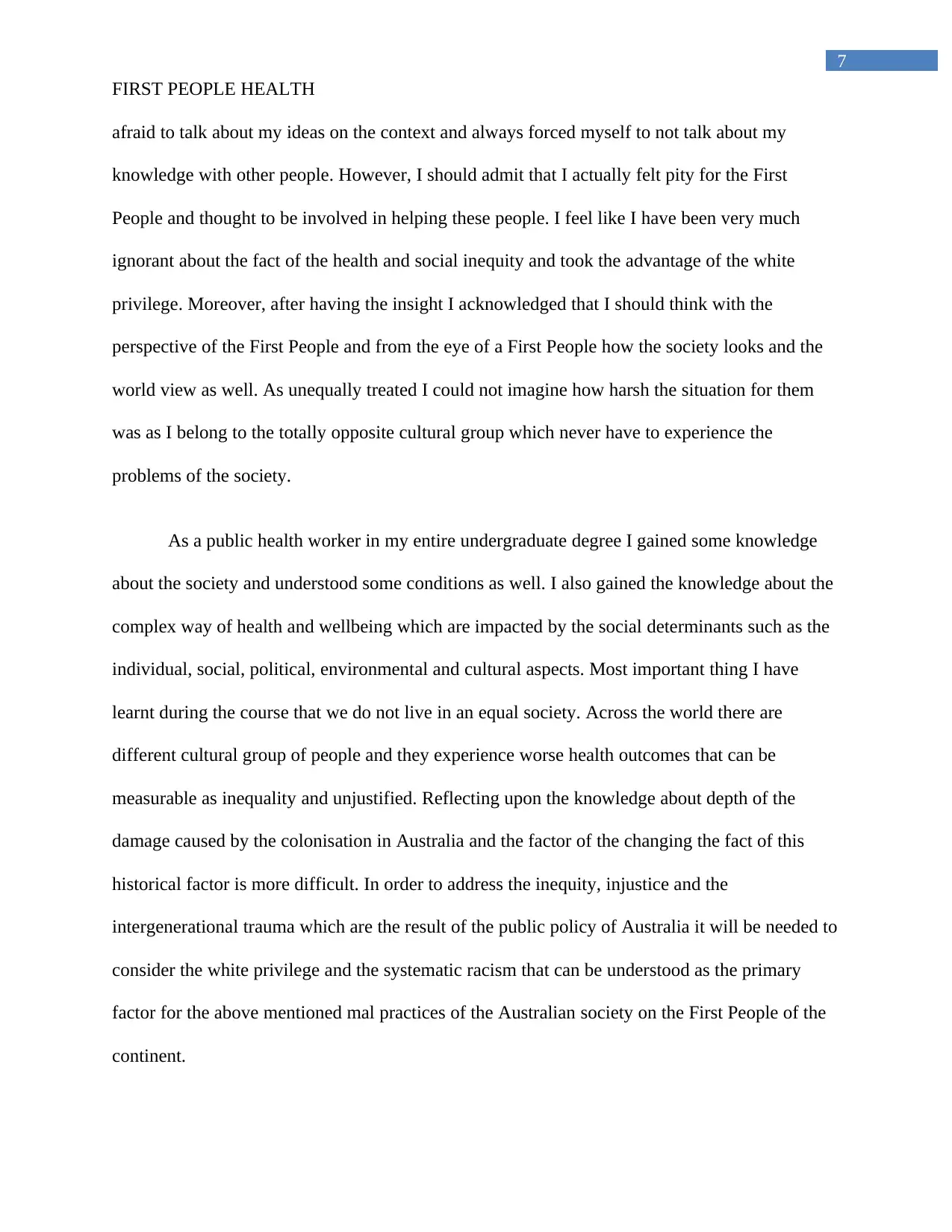
7
FIRST PEOPLE HEALTH
afraid to talk about my ideas on the context and always forced myself to not talk about my
knowledge with other people. However, I should admit that I actually felt pity for the First
People and thought to be involved in helping these people. I feel like I have been very much
ignorant about the fact of the health and social inequity and took the advantage of the white
privilege. Moreover, after having the insight I acknowledged that I should think with the
perspective of the First People and from the eye of a First People how the society looks and the
world view as well. As unequally treated I could not imagine how harsh the situation for them
was as I belong to the totally opposite cultural group which never have to experience the
problems of the society.
As a public health worker in my entire undergraduate degree I gained some knowledge
about the society and understood some conditions as well. I also gained the knowledge about the
complex way of health and wellbeing which are impacted by the social determinants such as the
individual, social, political, environmental and cultural aspects. Most important thing I have
learnt during the course that we do not live in an equal society. Across the world there are
different cultural group of people and they experience worse health outcomes that can be
measurable as inequality and unjustified. Reflecting upon the knowledge about depth of the
damage caused by the colonisation in Australia and the factor of the changing the fact of this
historical factor is more difficult. In order to address the inequity, injustice and the
intergenerational trauma which are the result of the public policy of Australia it will be needed to
consider the white privilege and the systematic racism that can be understood as the primary
factor for the above mentioned mal practices of the Australian society on the First People of the
continent.
FIRST PEOPLE HEALTH
afraid to talk about my ideas on the context and always forced myself to not talk about my
knowledge with other people. However, I should admit that I actually felt pity for the First
People and thought to be involved in helping these people. I feel like I have been very much
ignorant about the fact of the health and social inequity and took the advantage of the white
privilege. Moreover, after having the insight I acknowledged that I should think with the
perspective of the First People and from the eye of a First People how the society looks and the
world view as well. As unequally treated I could not imagine how harsh the situation for them
was as I belong to the totally opposite cultural group which never have to experience the
problems of the society.
As a public health worker in my entire undergraduate degree I gained some knowledge
about the society and understood some conditions as well. I also gained the knowledge about the
complex way of health and wellbeing which are impacted by the social determinants such as the
individual, social, political, environmental and cultural aspects. Most important thing I have
learnt during the course that we do not live in an equal society. Across the world there are
different cultural group of people and they experience worse health outcomes that can be
measurable as inequality and unjustified. Reflecting upon the knowledge about depth of the
damage caused by the colonisation in Australia and the factor of the changing the fact of this
historical factor is more difficult. In order to address the inequity, injustice and the
intergenerational trauma which are the result of the public policy of Australia it will be needed to
consider the white privilege and the systematic racism that can be understood as the primary
factor for the above mentioned mal practices of the Australian society on the First People of the
continent.
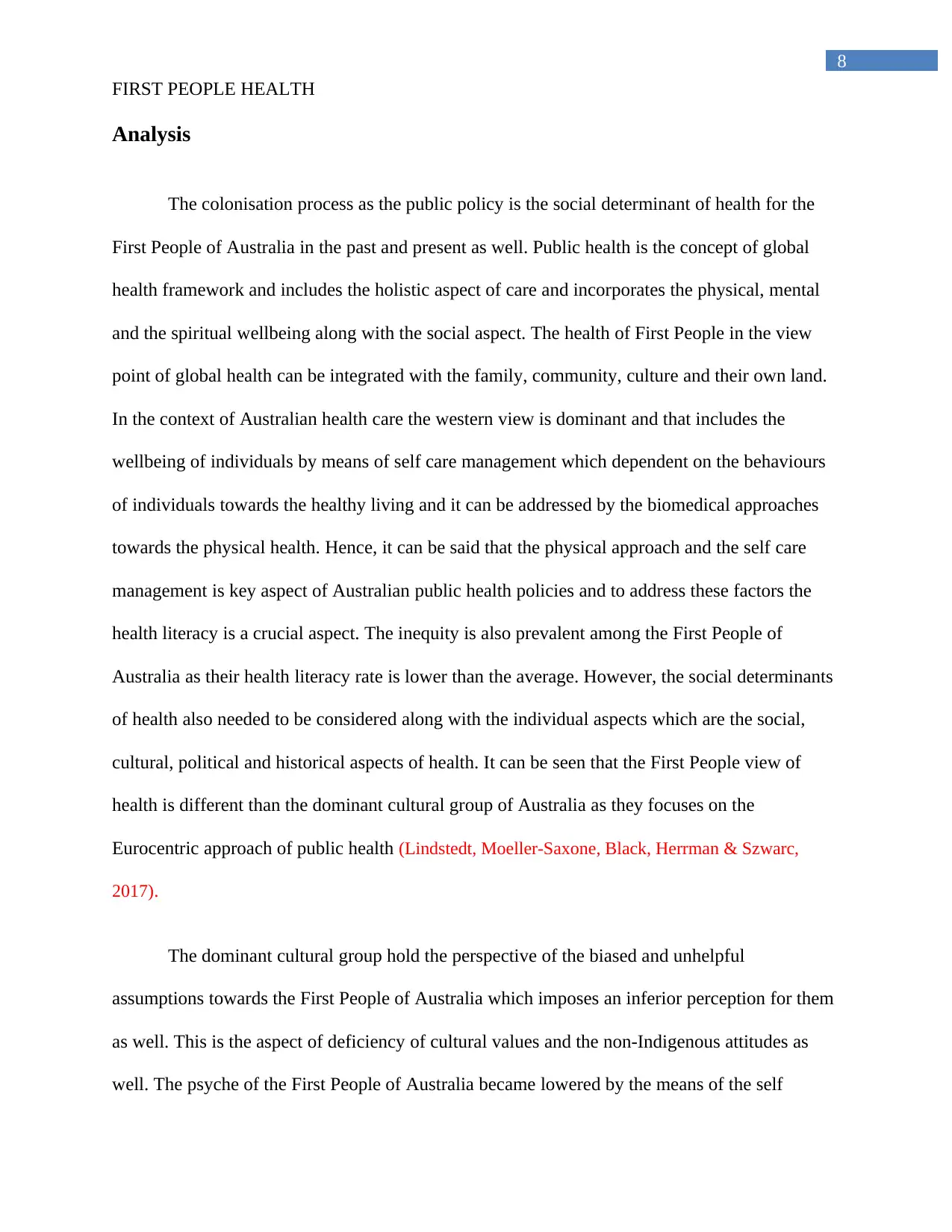
8
FIRST PEOPLE HEALTH
Analysis
The colonisation process as the public policy is the social determinant of health for the
First People of Australia in the past and present as well. Public health is the concept of global
health framework and includes the holistic aspect of care and incorporates the physical, mental
and the spiritual wellbeing along with the social aspect. The health of First People in the view
point of global health can be integrated with the family, community, culture and their own land.
In the context of Australian health care the western view is dominant and that includes the
wellbeing of individuals by means of self care management which dependent on the behaviours
of individuals towards the healthy living and it can be addressed by the biomedical approaches
towards the physical health. Hence, it can be said that the physical approach and the self care
management is key aspect of Australian public health policies and to address these factors the
health literacy is a crucial aspect. The inequity is also prevalent among the First People of
Australia as their health literacy rate is lower than the average. However, the social determinants
of health also needed to be considered along with the individual aspects which are the social,
cultural, political and historical aspects of health. It can be seen that the First People view of
health is different than the dominant cultural group of Australia as they focuses on the
Eurocentric approach of public health (Lindstedt, Moeller-Saxone, Black, Herrman & Szwarc,
2017).
The dominant cultural group hold the perspective of the biased and unhelpful
assumptions towards the First People of Australia which imposes an inferior perception for them
as well. This is the aspect of deficiency of cultural values and the non-Indigenous attitudes as
well. The psyche of the First People of Australia became lowered by the means of the self
FIRST PEOPLE HEALTH
Analysis
The colonisation process as the public policy is the social determinant of health for the
First People of Australia in the past and present as well. Public health is the concept of global
health framework and includes the holistic aspect of care and incorporates the physical, mental
and the spiritual wellbeing along with the social aspect. The health of First People in the view
point of global health can be integrated with the family, community, culture and their own land.
In the context of Australian health care the western view is dominant and that includes the
wellbeing of individuals by means of self care management which dependent on the behaviours
of individuals towards the healthy living and it can be addressed by the biomedical approaches
towards the physical health. Hence, it can be said that the physical approach and the self care
management is key aspect of Australian public health policies and to address these factors the
health literacy is a crucial aspect. The inequity is also prevalent among the First People of
Australia as their health literacy rate is lower than the average. However, the social determinants
of health also needed to be considered along with the individual aspects which are the social,
cultural, political and historical aspects of health. It can be seen that the First People view of
health is different than the dominant cultural group of Australia as they focuses on the
Eurocentric approach of public health (Lindstedt, Moeller-Saxone, Black, Herrman & Szwarc,
2017).
The dominant cultural group hold the perspective of the biased and unhelpful
assumptions towards the First People of Australia which imposes an inferior perception for them
as well. This is the aspect of deficiency of cultural values and the non-Indigenous attitudes as
well. The psyche of the First People of Australia became lowered by the means of the self
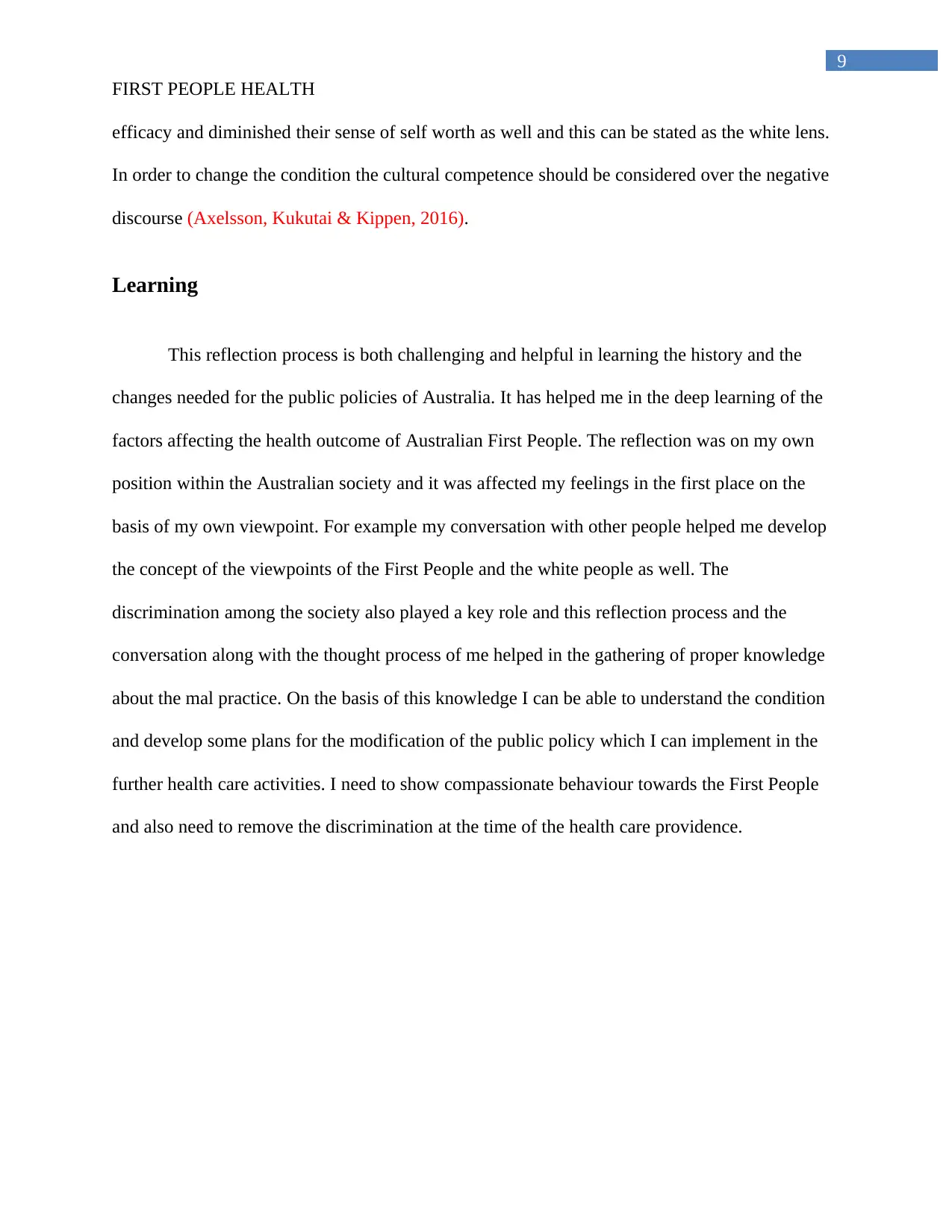
9
FIRST PEOPLE HEALTH
efficacy and diminished their sense of self worth as well and this can be stated as the white lens.
In order to change the condition the cultural competence should be considered over the negative
discourse (Axelsson, Kukutai & Kippen, 2016).
Learning
This reflection process is both challenging and helpful in learning the history and the
changes needed for the public policies of Australia. It has helped me in the deep learning of the
factors affecting the health outcome of Australian First People. The reflection was on my own
position within the Australian society and it was affected my feelings in the first place on the
basis of my own viewpoint. For example my conversation with other people helped me develop
the concept of the viewpoints of the First People and the white people as well. The
discrimination among the society also played a key role and this reflection process and the
conversation along with the thought process of me helped in the gathering of proper knowledge
about the mal practice. On the basis of this knowledge I can be able to understand the condition
and develop some plans for the modification of the public policy which I can implement in the
further health care activities. I need to show compassionate behaviour towards the First People
and also need to remove the discrimination at the time of the health care providence.
FIRST PEOPLE HEALTH
efficacy and diminished their sense of self worth as well and this can be stated as the white lens.
In order to change the condition the cultural competence should be considered over the negative
discourse (Axelsson, Kukutai & Kippen, 2016).
Learning
This reflection process is both challenging and helpful in learning the history and the
changes needed for the public policies of Australia. It has helped me in the deep learning of the
factors affecting the health outcome of Australian First People. The reflection was on my own
position within the Australian society and it was affected my feelings in the first place on the
basis of my own viewpoint. For example my conversation with other people helped me develop
the concept of the viewpoints of the First People and the white people as well. The
discrimination among the society also played a key role and this reflection process and the
conversation along with the thought process of me helped in the gathering of proper knowledge
about the mal practice. On the basis of this knowledge I can be able to understand the condition
and develop some plans for the modification of the public policy which I can implement in the
further health care activities. I need to show compassionate behaviour towards the First People
and also need to remove the discrimination at the time of the health care providence.
Paraphrase This Document
Need a fresh take? Get an instant paraphrase of this document with our AI Paraphraser
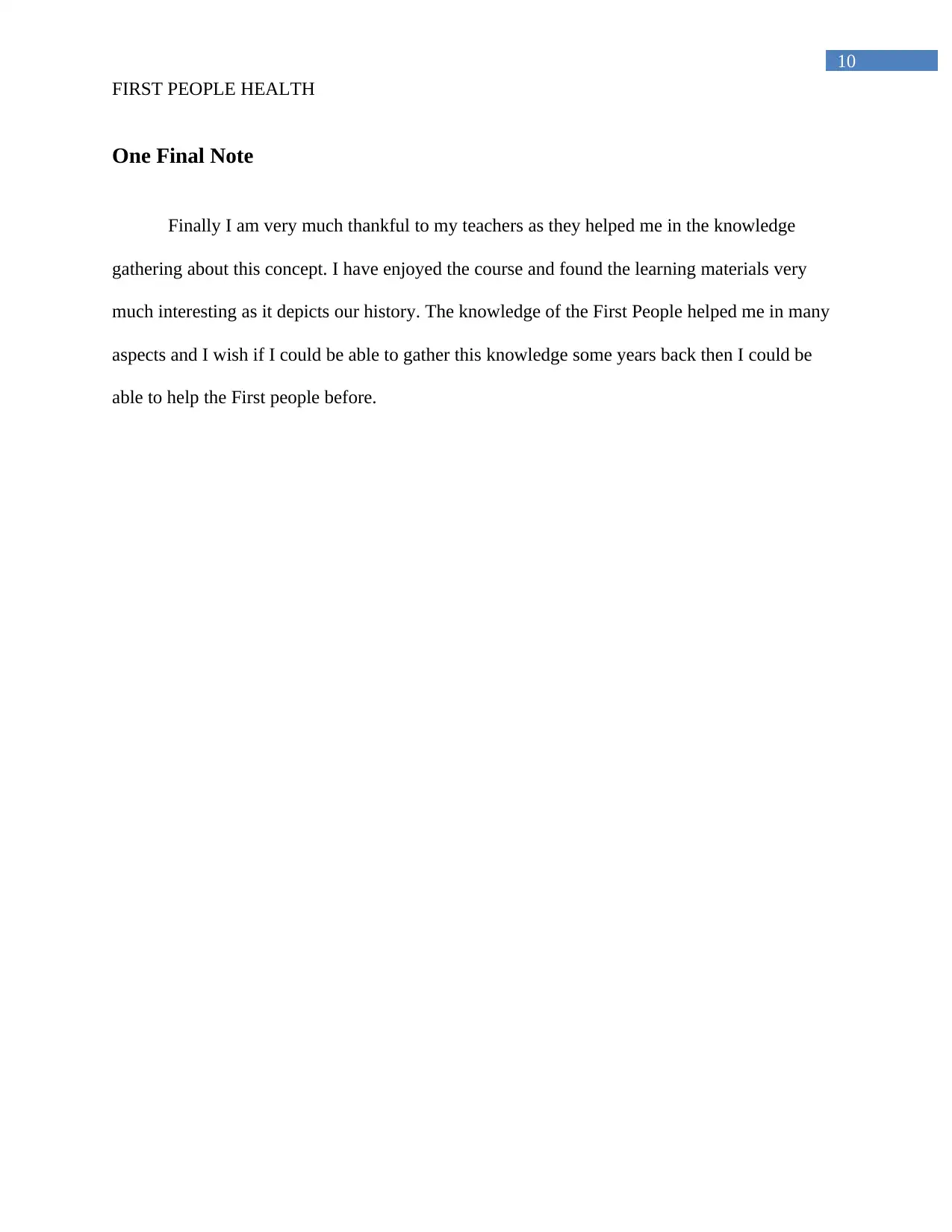
10
FIRST PEOPLE HEALTH
One Final Note
Finally I am very much thankful to my teachers as they helped me in the knowledge
gathering about this concept. I have enjoyed the course and found the learning materials very
much interesting as it depicts our history. The knowledge of the First People helped me in many
aspects and I wish if I could be able to gather this knowledge some years back then I could be
able to help the First people before.
FIRST PEOPLE HEALTH
One Final Note
Finally I am very much thankful to my teachers as they helped me in the knowledge
gathering about this concept. I have enjoyed the course and found the learning materials very
much interesting as it depicts our history. The knowledge of the First People helped me in many
aspects and I wish if I could be able to gather this knowledge some years back then I could be
able to help the First people before.
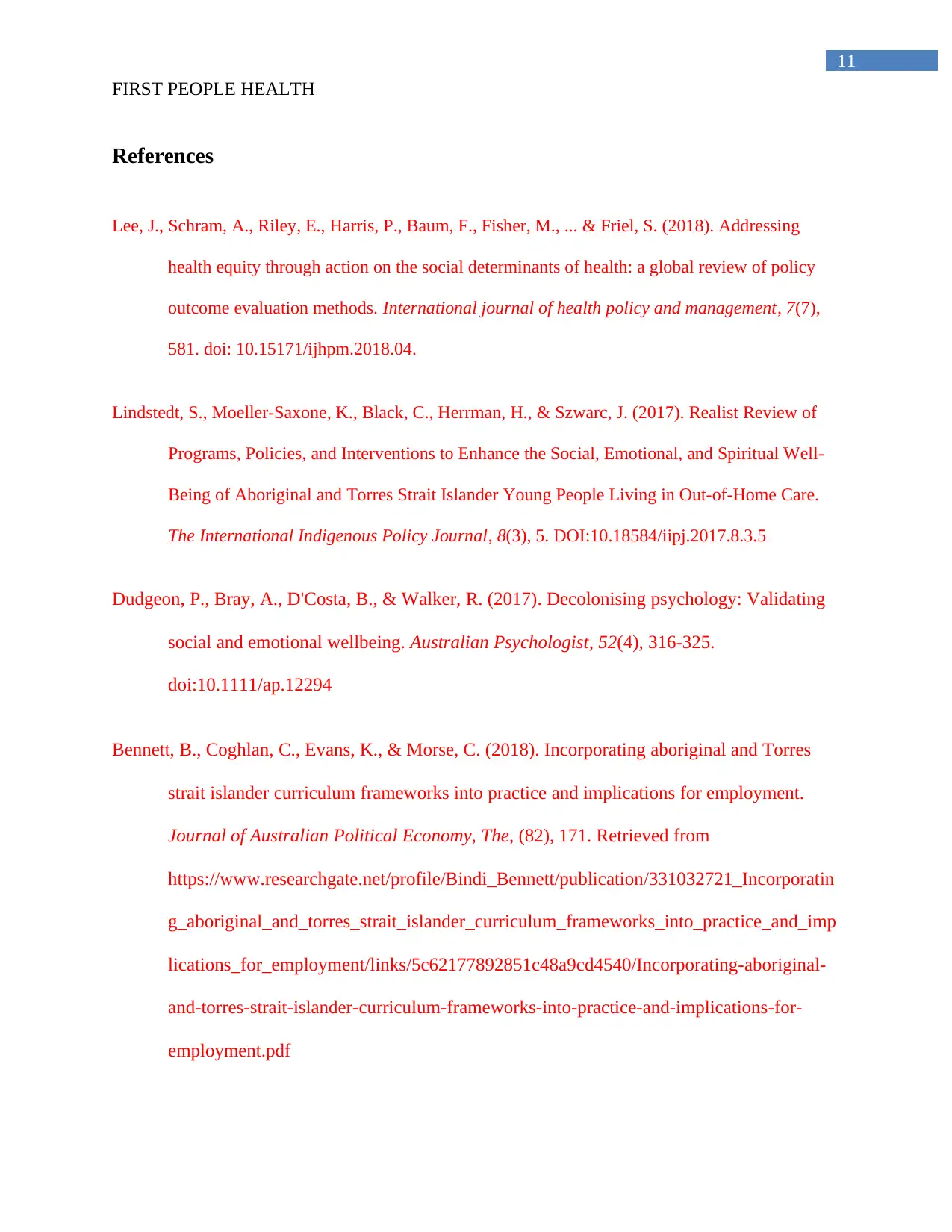
11
FIRST PEOPLE HEALTH
References
Lee, J., Schram, A., Riley, E., Harris, P., Baum, F., Fisher, M., ... & Friel, S. (2018). Addressing
health equity through action on the social determinants of health: a global review of policy
outcome evaluation methods. International journal of health policy and management, 7(7),
581. doi: 10.15171/ijhpm.2018.04.
Lindstedt, S., Moeller-Saxone, K., Black, C., Herrman, H., & Szwarc, J. (2017). Realist Review of
Programs, Policies, and Interventions to Enhance the Social, Emotional, and Spiritual Well-
Being of Aboriginal and Torres Strait Islander Young People Living in Out-of-Home Care.
The International Indigenous Policy Journal, 8(3), 5. DOI:10.18584/iipj.2017.8.3.5
Dudgeon, P., Bray, A., D'Costa, B., & Walker, R. (2017). Decolonising psychology: Validating
social and emotional wellbeing. Australian Psychologist, 52(4), 316-325.
doi:10.1111/ap.12294
Bennett, B., Coghlan, C., Evans, K., & Morse, C. (2018). Incorporating aboriginal and Torres
strait islander curriculum frameworks into practice and implications for employment.
Journal of Australian Political Economy, The, (82), 171. Retrieved from
https://www.researchgate.net/profile/Bindi_Bennett/publication/331032721_Incorporatin
g_aboriginal_and_torres_strait_islander_curriculum_frameworks_into_practice_and_imp
lications_for_employment/links/5c62177892851c48a9cd4540/Incorporating-aboriginal-
and-torres-strait-islander-curriculum-frameworks-into-practice-and-implications-for-
employment.pdf
FIRST PEOPLE HEALTH
References
Lee, J., Schram, A., Riley, E., Harris, P., Baum, F., Fisher, M., ... & Friel, S. (2018). Addressing
health equity through action on the social determinants of health: a global review of policy
outcome evaluation methods. International journal of health policy and management, 7(7),
581. doi: 10.15171/ijhpm.2018.04.
Lindstedt, S., Moeller-Saxone, K., Black, C., Herrman, H., & Szwarc, J. (2017). Realist Review of
Programs, Policies, and Interventions to Enhance the Social, Emotional, and Spiritual Well-
Being of Aboriginal and Torres Strait Islander Young People Living in Out-of-Home Care.
The International Indigenous Policy Journal, 8(3), 5. DOI:10.18584/iipj.2017.8.3.5
Dudgeon, P., Bray, A., D'Costa, B., & Walker, R. (2017). Decolonising psychology: Validating
social and emotional wellbeing. Australian Psychologist, 52(4), 316-325.
doi:10.1111/ap.12294
Bennett, B., Coghlan, C., Evans, K., & Morse, C. (2018). Incorporating aboriginal and Torres
strait islander curriculum frameworks into practice and implications for employment.
Journal of Australian Political Economy, The, (82), 171. Retrieved from
https://www.researchgate.net/profile/Bindi_Bennett/publication/331032721_Incorporatin
g_aboriginal_and_torres_strait_islander_curriculum_frameworks_into_practice_and_imp
lications_for_employment/links/5c62177892851c48a9cd4540/Incorporating-aboriginal-
and-torres-strait-islander-curriculum-frameworks-into-practice-and-implications-for-
employment.pdf
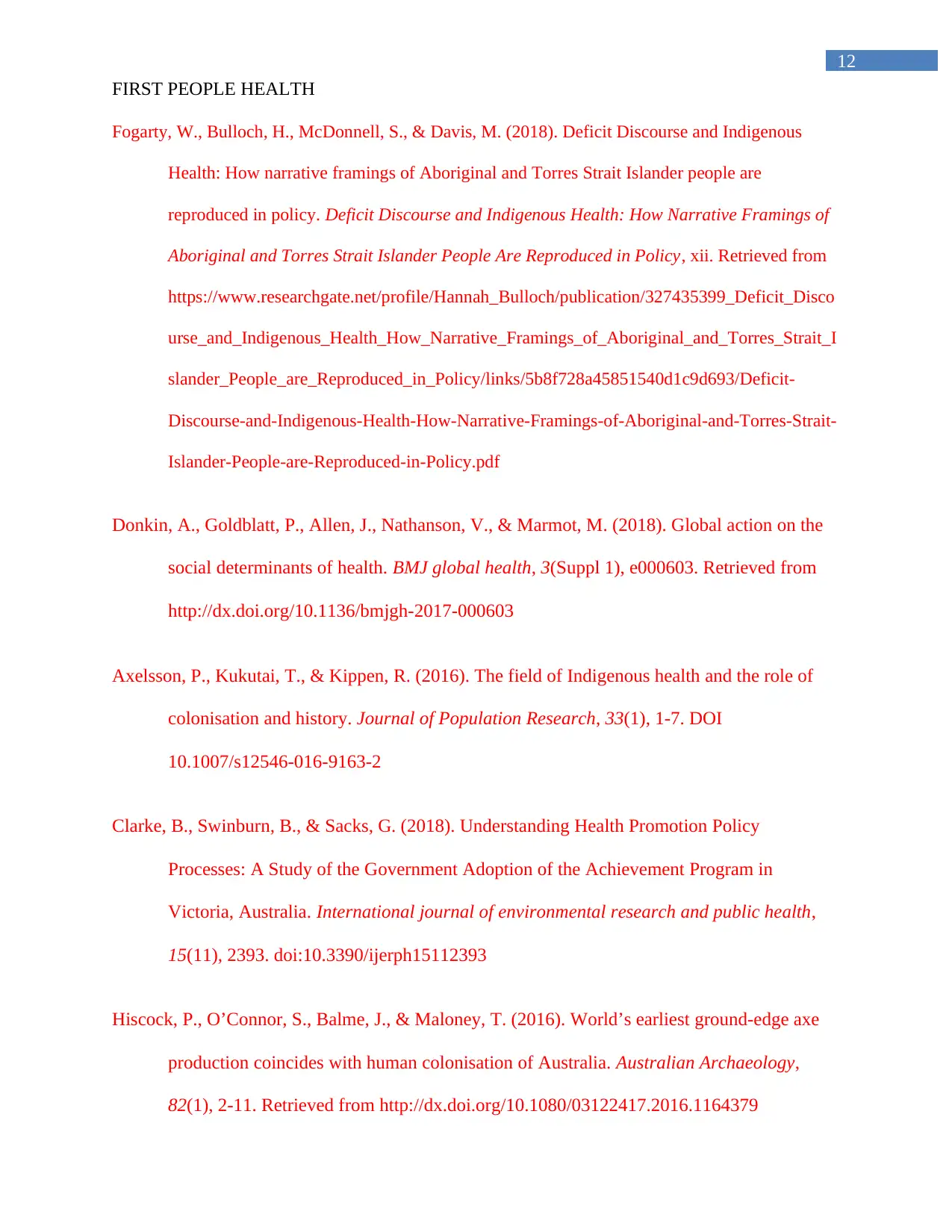
12
FIRST PEOPLE HEALTH
Fogarty, W., Bulloch, H., McDonnell, S., & Davis, M. (2018). Deficit Discourse and Indigenous
Health: How narrative framings of Aboriginal and Torres Strait Islander people are
reproduced in policy. Deficit Discourse and Indigenous Health: How Narrative Framings of
Aboriginal and Torres Strait Islander People Are Reproduced in Policy, xii. Retrieved from
https://www.researchgate.net/profile/Hannah_Bulloch/publication/327435399_Deficit_Disco
urse_and_Indigenous_Health_How_Narrative_Framings_of_Aboriginal_and_Torres_Strait_I
slander_People_are_Reproduced_in_Policy/links/5b8f728a45851540d1c9d693/Deficit-
Discourse-and-Indigenous-Health-How-Narrative-Framings-of-Aboriginal-and-Torres-Strait-
Islander-People-are-Reproduced-in-Policy.pdf
Donkin, A., Goldblatt, P., Allen, J., Nathanson, V., & Marmot, M. (2018). Global action on the
social determinants of health. BMJ global health, 3(Suppl 1), e000603. Retrieved from
http://dx.doi.org/10.1136/bmjgh-2017-000603
Axelsson, P., Kukutai, T., & Kippen, R. (2016). The field of Indigenous health and the role of
colonisation and history. Journal of Population Research, 33(1), 1-7. DOI
10.1007/s12546-016-9163-2
Clarke, B., Swinburn, B., & Sacks, G. (2018). Understanding Health Promotion Policy
Processes: A Study of the Government Adoption of the Achievement Program in
Victoria, Australia. International journal of environmental research and public health,
15(11), 2393. doi:10.3390/ijerph15112393
Hiscock, P., O’Connor, S., Balme, J., & Maloney, T. (2016). World’s earliest ground-edge axe
production coincides with human colonisation of Australia. Australian Archaeology,
82(1), 2-11. Retrieved from http://dx.doi.org/10.1080/03122417.2016.1164379
FIRST PEOPLE HEALTH
Fogarty, W., Bulloch, H., McDonnell, S., & Davis, M. (2018). Deficit Discourse and Indigenous
Health: How narrative framings of Aboriginal and Torres Strait Islander people are
reproduced in policy. Deficit Discourse and Indigenous Health: How Narrative Framings of
Aboriginal and Torres Strait Islander People Are Reproduced in Policy, xii. Retrieved from
https://www.researchgate.net/profile/Hannah_Bulloch/publication/327435399_Deficit_Disco
urse_and_Indigenous_Health_How_Narrative_Framings_of_Aboriginal_and_Torres_Strait_I
slander_People_are_Reproduced_in_Policy/links/5b8f728a45851540d1c9d693/Deficit-
Discourse-and-Indigenous-Health-How-Narrative-Framings-of-Aboriginal-and-Torres-Strait-
Islander-People-are-Reproduced-in-Policy.pdf
Donkin, A., Goldblatt, P., Allen, J., Nathanson, V., & Marmot, M. (2018). Global action on the
social determinants of health. BMJ global health, 3(Suppl 1), e000603. Retrieved from
http://dx.doi.org/10.1136/bmjgh-2017-000603
Axelsson, P., Kukutai, T., & Kippen, R. (2016). The field of Indigenous health and the role of
colonisation and history. Journal of Population Research, 33(1), 1-7. DOI
10.1007/s12546-016-9163-2
Clarke, B., Swinburn, B., & Sacks, G. (2018). Understanding Health Promotion Policy
Processes: A Study of the Government Adoption of the Achievement Program in
Victoria, Australia. International journal of environmental research and public health,
15(11), 2393. doi:10.3390/ijerph15112393
Hiscock, P., O’Connor, S., Balme, J., & Maloney, T. (2016). World’s earliest ground-edge axe
production coincides with human colonisation of Australia. Australian Archaeology,
82(1), 2-11. Retrieved from http://dx.doi.org/10.1080/03122417.2016.1164379
Secure Best Marks with AI Grader
Need help grading? Try our AI Grader for instant feedback on your assignments.
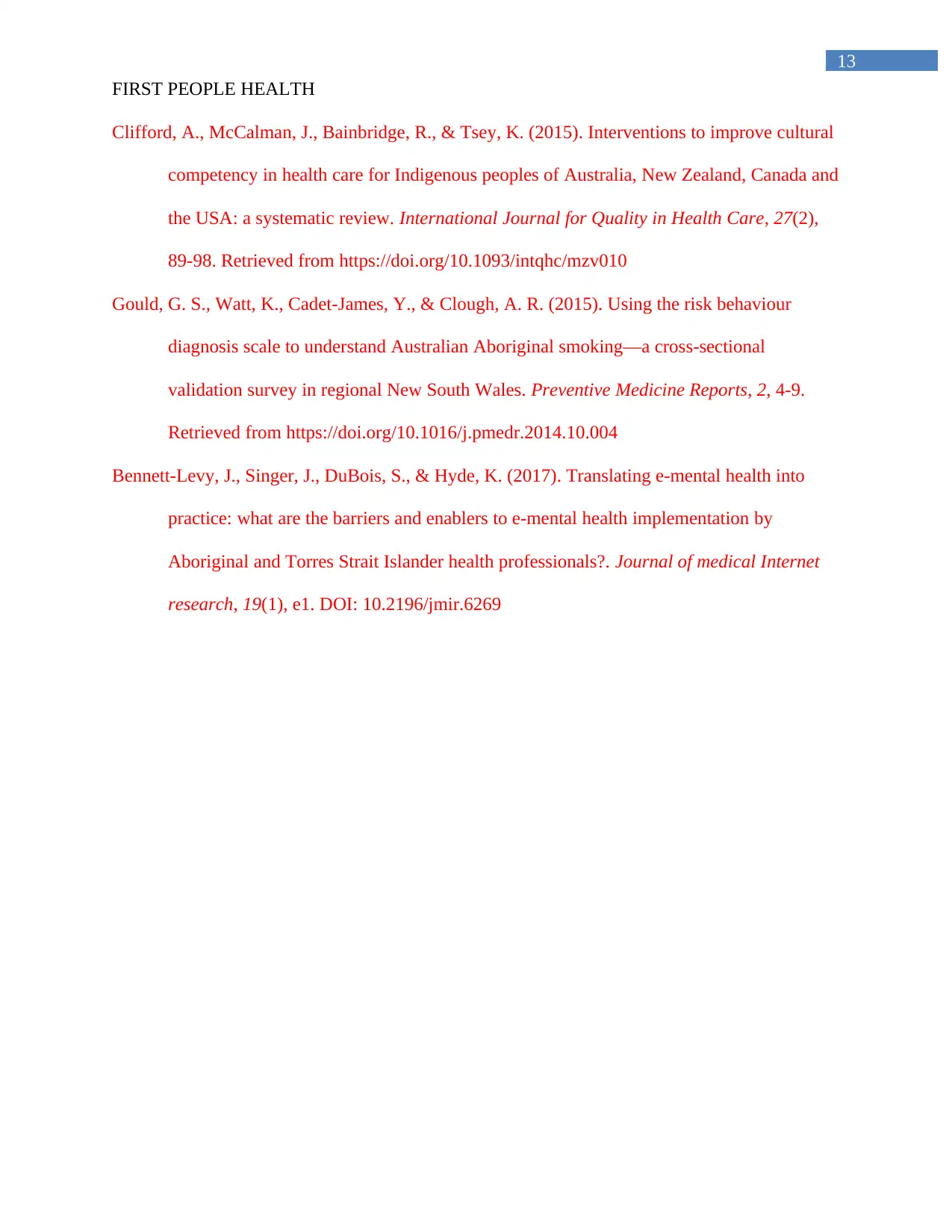
13
FIRST PEOPLE HEALTH
Clifford, A., McCalman, J., Bainbridge, R., & Tsey, K. (2015). Interventions to improve cultural
competency in health care for Indigenous peoples of Australia, New Zealand, Canada and
the USA: a systematic review. International Journal for Quality in Health Care, 27(2),
89-98. Retrieved from https://doi.org/10.1093/intqhc/mzv010
Gould, G. S., Watt, K., Cadet-James, Y., & Clough, A. R. (2015). Using the risk behaviour
diagnosis scale to understand Australian Aboriginal smoking—a cross-sectional
validation survey in regional New South Wales. Preventive Medicine Reports, 2, 4-9.
Retrieved from https://doi.org/10.1016/j.pmedr.2014.10.004
Bennett-Levy, J., Singer, J., DuBois, S., & Hyde, K. (2017). Translating e-mental health into
practice: what are the barriers and enablers to e-mental health implementation by
Aboriginal and Torres Strait Islander health professionals?. Journal of medical Internet
research, 19(1), e1. DOI: 10.2196/jmir.6269
FIRST PEOPLE HEALTH
Clifford, A., McCalman, J., Bainbridge, R., & Tsey, K. (2015). Interventions to improve cultural
competency in health care for Indigenous peoples of Australia, New Zealand, Canada and
the USA: a systematic review. International Journal for Quality in Health Care, 27(2),
89-98. Retrieved from https://doi.org/10.1093/intqhc/mzv010
Gould, G. S., Watt, K., Cadet-James, Y., & Clough, A. R. (2015). Using the risk behaviour
diagnosis scale to understand Australian Aboriginal smoking—a cross-sectional
validation survey in regional New South Wales. Preventive Medicine Reports, 2, 4-9.
Retrieved from https://doi.org/10.1016/j.pmedr.2014.10.004
Bennett-Levy, J., Singer, J., DuBois, S., & Hyde, K. (2017). Translating e-mental health into
practice: what are the barriers and enablers to e-mental health implementation by
Aboriginal and Torres Strait Islander health professionals?. Journal of medical Internet
research, 19(1), e1. DOI: 10.2196/jmir.6269
1 out of 14
![[object Object]](/_next/static/media/star-bottom.7253800d.svg)





